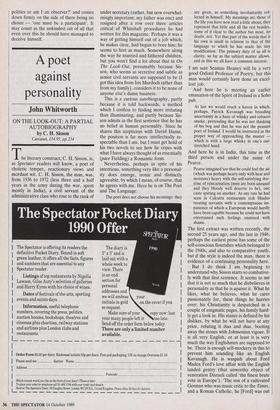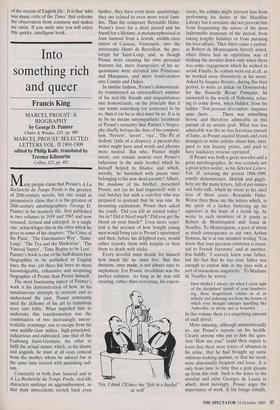A poet against personality
John Whitworth
ON THE LOOK-OUT: A PARTIAL AUTOBIOGRAPHY .
by C. H. Sisson Carcanet, £14.95, pp.234 The literary construct, C. H. Sisson, is, as Spectator readers will know, a poet of choleric temper, reactionary views and mordant wit. C. H. Sisson, the man, was, from 1936 to 1972 (less three and a half years in the army during the war, spent mostly in India), a civil servant of the administrative class who rose to the rank of under secretary (rather, but now overwhel- mingly important; my father was one) and resigned after a row over three articles critical of Whitehall procedures he had written for this magazine. Perhaps it was a way of getting himself out of a job which, he makes clear, had begun to bore him; he seems to hint as much. Somewhere along the way he married and fathered children, but you won't find a lot about that in On The Look-Out, presumably because Sis- son, who seems as secretive and subtle as senior civil servants are supposed to be (I got this idea from Iris Murdoch rather than from my family), considers it to be none of anyone else's damn business.
This is a curious autobiography, partly because it is told backwards, a method which I confess to finding more irritating than illuminating, and partly because Sis- son admits in the first sentence that he has no belief in human personality. Since he shares this scepticism with David Hume, the position is far more intellectually re- spectable than I am, but I must get hold of his two novels to see how he copes with what I have always thought of as essentially (pace Fielding) a Romantic form.
Nevertheless, perhaps in spite of his intentions, something very like a personal= ity does emerge, ironic and distinctly agreeable, by which I mean, of course, that he agrees with me. Here he is on The Poet and The Language:
The poet does not choose his meanings: they are given, as something involuntarily col- lected in himself. My meanings are those of the life you have now read a little about; they represent that little and all the rest besides, some of it clear to the author but most, no doubt, not. Yet that part of the words that is his own is small in relation to that of the language to which he has made his tiny modification. The primary duty of us all is clarity, so far as the subject matter allows, and in this we all have a common interest.
I am sure Seamus Heaney will be a very good Oxford Professor of Poetry, but this man would certainly have done an excel- lent job.
And here he is meeting an earlier emanation of the Spirit of Ireland in a Soho pub.
At last we would reach a haven in which, perhaps, Patrick Kavanagh was brooding uncertainly in a haze of whisky and tobacco smoke, pretending that he was not thinking of his bog and that he was not the peasant poet of Ireland. I would be instructed in the proper way of approaching the master which is with a large whisky in one's out- stretched hand.
And here he is in India, this time in the third person and under the name of Pearce.
Pearce imagined too that he could feel the air (which was perhaps heavy only with heat and moisture) heavy with the self-satisfying doc- trine of reincarnation (men are born unequal and they bloody well deserve to be), one caste spitting on another. At any rate he had seen in Calcutta restaurants rich Hindus treating servants with a contemptuous im- patience of which a European would hardly have been capable because he could not have entertained such feelings unmixed with shame.
The first extract was written recently, the second 25 years ago, and the last in 1946; perhaps the earliest prose has some of the self-conscious flourishes which belonged to the 1940s, and also to comparative youth, but if the style is indeed the man, there is evidence of a continuing personality here.
But I do think I am beginning to understand why Sisson starts so combative- ly with that first sentence. It seems to me that it is not so much that he disbelieves in personality as that he is against it. What he likes, what he believes, what he cares passionately for, these things he hurries over; his Christianity is despatched in a couple of enigmatic pages, his family hard- ly get a look in. His stance is defined by his dislikes, by what he will not have at any price, refuting it thus and thus, booting away the stones with Johnsonian vigour. It is all very English, or at least it is very much the way Englishmen are supposed to be. There is enough self-mockery in this to prevent him sounding like an English Kavanagh. He is waspish about Ford Madox Ford's love affair with the English landed gentry (that unworthy object of veneration Disraeli called 'the finest brute vote in Europe'). 'The son of a cultivated German who was music critic to the Times, and a Roman Catholic, he [Ford] was out of the stream of English life'. It is that 'who was music critic of the Times' that redeems the observation from crassness and makes me smile. If you smile also you will enjoy this quirky, intelligent book.



























































 Previous page
Previous page